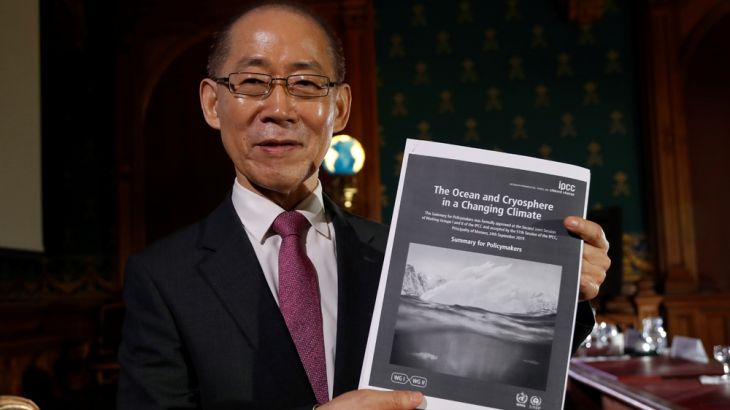IPCC urges emissions cut to avert disastrous sea level rise
Landmark IPCC study calls for radical action to avert some of the worst possible outcomes of global warming.

Slash carbon emissions or watch cities vanish under rising seas, rivers run dry and marine life collapse – that is the stark warning delivered to the world by scientists behind a landmark climate study.
In its new report examining the links between oceans, glaciers, ice caps and the climate, the United Nations-backed Intergovernmental Panel on Climate Change (IPCC) has said that radical action may yet avert some of the worst possible outcomes of global warming.
Keep reading
list of 4 itemsAfter the Hurricane
World’s coral reefs face global bleaching crisis
Why is Germany maintaining economic ties with China?
“The more decisively and the earlier we act, the more able we will be to address unavoidable changes,” Debra Robert, cochair of the IPCC, said at a news conference on Wednesday.
But the study also said that allowing carbon emissions to rise would upset the balance of the geophysical systems governing oceans and the frozen regions of the Earth so profoundly that nobody would escape untouched.
“The oceans and the icy parts of the world are in big trouble and that means we’re all in big trouble too,” said one of the report’s lead authors, Michael Oppenheimer, professor of geosciences and international affairs at Princeton University. “The changes are accelerating.”
Finalised on Tuesday in Monaco, the report was the culmination of two years of work by the IPCC.
‘Lifestyle changes’
Compiled by more than 100 authors who crunched 7,000 academic papers, the study documents the implications of warming oceans, fast-melting ice sheets in Greenland and Antarctica and shrinking glaciers.
The report projects that sea levels could rise by one metre (3.3 feet) by 2100 – 10 times the rate of the 20th century – if emissions keep climbing.
In the Himalayas, glaciers feeding 10 rivers, including the Ganges and the Yangtze, could shrink dramatically if emissions do not fall, hitting water supplies across a swathe of Asia.
“Yes, the climate is changing, yes, the planet is changing, yes we are getting to over temperature,” Serge Planes, research director of the French Centre of Scientific Research, told Al Jazeera.
“This is going to change our habits – this is already changing the wildlife, this is also going to change also agriculture and it’s also going to change the way we’re living and our lifestyle,” he added.
🌊#IPCC Special Report on the Ocean and Cryosphere in a Changing Climate
Our Ocean and Cryosphere – They sustain us. They are under pressure. Their changes affect all our lives. The time for action is now.#SROCC PR ➡️ https://t.co/HrSmr14Cu5
SPM ➡️ https://t.co/Zq29IY9KxX pic.twitter.com/hC3KHOmAv8— IPCC (@IPCC_CH) September 25, 2019
Systems changing like never before
Carbon emissions, which hit a record high last year, are projected to inflict a devastating toll on oceans, which have so far buffered almost all the man-made warming generated by burning coal, oil and gas.
With the oceans getting hotter, what are known as “marine heatwaves” are becoming more intense and affecting coral reefs. And as more carbon dioxide dissolves in the water, the oceans are also becoming more acidic, damaging ecosystems.
The rising temperatures are in turn starving the upper layers of the water of oxygen, suffocating marine life, creating growing dead zones and disrupting the circulation of ocean currents, which then unleashes more disruptive weather on land.
The authors of the study say that long lag times at work in oceans mean that some of these changes will inevitably intensify over centuries – even if the world stopped emitting all its greenhouse gases tomorrow.
But if emissions are allowed to continue rising then the effects are likely to start accelerating so rapidly that they will overwhelm societies’ capacity to cope, with the poorest and most vulnerable communities and countries succumbing first.
“In a high emissions scenario, the chances of having any reasonable foothold to deal with the impacts becomes much smaller,” said Matthias Garschagen, chair in human geography at LMU Munich and one of the authors.
“Systems are changing in a way in recent history that they’ve never changed before.”